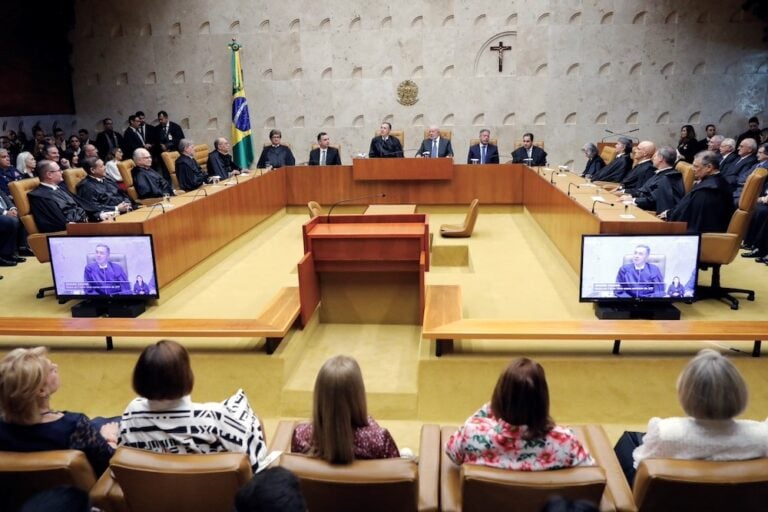(RSF/IFEX) – Reporters Without Borders has condemned the disparity in the level of press freedom experienced by Brazil’s national media and the media in the provinces, which have been subjected to an unacceptable degree of violence as well as harassment and abuse of power by local officials in the first three months of 2006. “There […]
(RSF/IFEX) – Reporters Without Borders has condemned the disparity in the level of press freedom experienced by Brazil’s national media and the media in the provinces, which have been subjected to an unacceptable degree of violence as well as harassment and abuse of power by local officials in the first three months of 2006.
“There is no comparison between working for a national news organisation and working for a local or regional one, but we do not distinguish between major and minor news media when press freedom is at stake,” Reporters Without Borders said.
“The governments of the states where journalists are most exposed should, as a matter of urgency, crack down on violence against the press, for which their own employees are too often responsible,” the press freedom organisation continued. “And, at the juridical level, the federal government has a duty to monitor and ensure an overall equivalence in the press legislation in the different states.”
Reporters Without Borders added: “We voice our support for journalists in the provinces and we hope the demands they make on ‘Journalist’s Day’ on 7 April 2006 will get the attention they deserve.”
In the most recent case of violence against the press, “Jornal do Commercio” photographer Alexandro Auler was attacked by two guards while reporting at São João prison in the northern state of Pernambuco on 15 March. They held the photographer in a cell, threatened him and damaged his equipment.
In the far south state of Río Grande do Sul, regional police delegate Rudimar de Freitas Rosales threatened Luciamem Caiaffo Winck, Luis Gonçalves and Jurema Josefa of the “Correio de Povo” daily newspaper on 8 March in an attempt to force them to reveal their sources for a story about the occupation of an industrial site by landless peasants in Barra do Ribeira.
Tapping the phones of the news media to find out the source of their reports continues to be a sensitive issue. Reporters Without Borders wrote to federal justice minister Márcio Thomaz Bastos on 26 January voicing concern about a bill extending phone-tapping that was to be presented to congress in Brasilia. The bill has not advanced but the practice continues at the local level.
The National Federation of Journalists (FENAJ) reported that on 17 March, the Human Rights Defence Council (CDDPH) began to investigate the authorities in the southeastern state of Espírito Santo over the tapping of the phones of around 100 journalists working for the Rede Gazeta press group. Although the tapping was authorised by a judge, the federal justice minister asked the CDDPH to investigate, following an outcry about the case.
Local journalists are often the victims of violent crime. The journalists’ union in the northern state of Pará said journalists working for the Belem-based daily “O Liberal” have been held up at least four times this year. The latest case was on 3 March when reporter Alexandra Jamile and photographer Antônio Silva were covering water reprocessing in the dangerous neighbourhood of Sacramenta. They were held up by two gunmen who demanded Silva’s camera. It was subsequently found by the police.
Two journalists have been killed so far this year. André Felipe, who worked for two radio stations, Mega 94 and Cultura AM, was gunned down on 4 February in Campo Grande, capital of the centralwestern state of Mato Grosso do Sul. The shooting appears not to have been linked to his work as a journalist because his two confessed killers, soldiers Everaldo Ferreira Marinho and Bruno da Silva Galvão, said they shot “just to scare him” in the course of a hold-up.
Another journalist was killed in Mato Grosso do Sul on 13 March. It was José Késsio, who was shot 11 times by a man with a 9 mm pistol who came looking for him at Amambay FM, the local radio station he worked for in Ponta Porã, on the Paraguayan border.
Reporters Without Borders has learned that the victim’s 10-year-old son, a witness of the shooting, has identified the killer as Renato José Fonseca Chiodi, a childhood friend of his father and former neighbour who escaped from prison in 2003 and who is still a fugitive from justice. He is currently believed to be in Paraguay.
It is assumed the motive for the murder was a personal grudge, but it was the second time in six months that Amambay FM has lost a journalist this way. Késsio’s former colleague Fábio Soares Barbosa was gunned down in similar circumstances on 16 September. A third radio journalist, Conquista FM manager Samuel Román was murdered on 20 April 2004 in the same crime-ridden border region.


